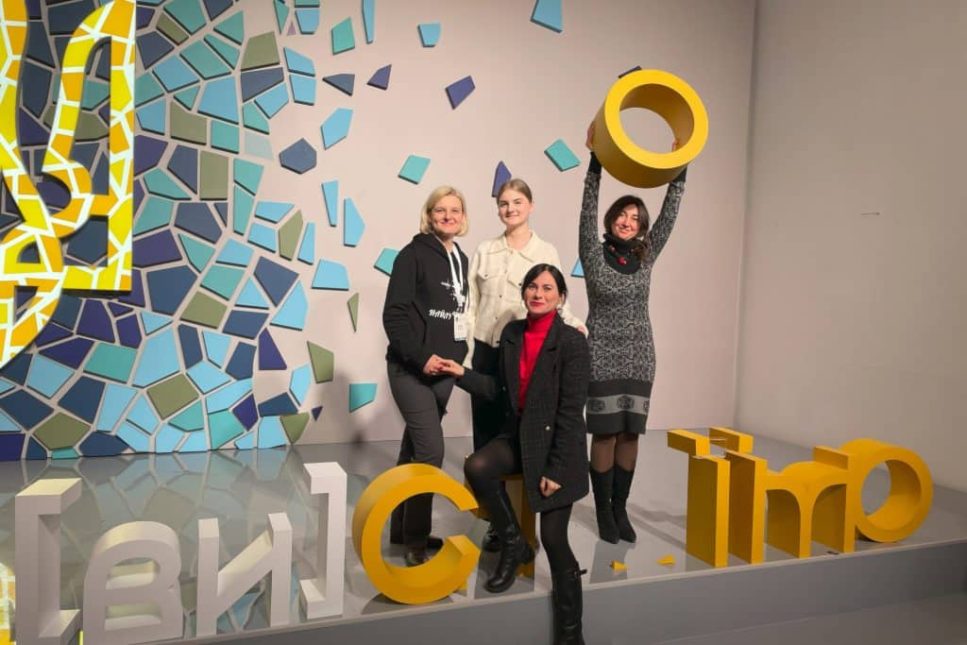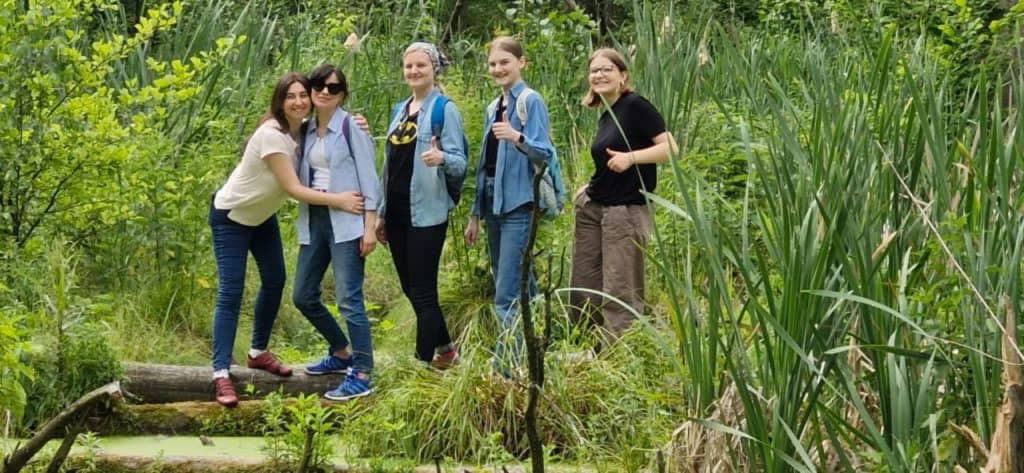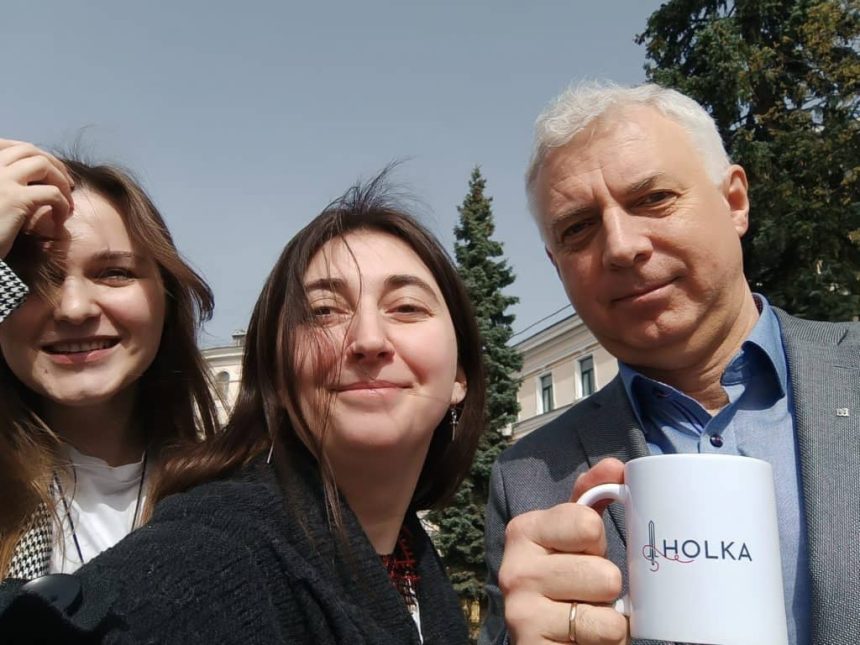
Holka: building a network of activists to fight corruption across Ukraine
21/03/2025
“War unites people. It is in times like these that society can foster strong communities, forge values, and protect and advance statehood. The crisis caused by the US foreign aid funding cuts has further accelerated networking and community-building in civil society and across all sectors. We all want to do what we can to shape a new, united community and to protect the Ukrainian state and our democracy,” says Iryna Fedoriv, co-founder of the Holka NGO.
As well-known activists and journalists, Iryna Fedoriv and Margarita Sytnik founded Holka in early 2024 to unite civil society, media, representatives from various branches of government, business and international partners to protect democratic values and strengthen Ukrainian statehood. Holka collaborates with representatives from the media and other experts to help solve problems and challenges and to explain this in easy-to-understand language to wider audiences. The European Endowment for Democracy (EED) provided seed funding for the initiative.

Iryna explains that the word Holka or ‘needle’ marks their ambition to build a new network of leaders from the media and civil society, as well as politicians and judges, who together can empower civil activists from across Ukraine in forming a vision for the development of the Ukrainian state and communities.
“We want to ‘sew’ together a network that protects values that are important to us all,” she says.
Pursuing a reform agenda
Iryna explains that Holka works to identify and monitor instances of corruption by local and state governments, or policies that enable this to take place. As a network, they help to empower local anti-corruption initiatives across Ukraine to ensure that these can have maximum impact.
“We need transparency during Ukraine’s reconstruction, and we need a legal framework that ensures this transparency. Otherwise, our partners will not understand and then we won’t have funding,” warns Iryna Fedoriv.
Holka is also monitoring the ongoing decentralisation reforms in Ukraine, as well as electoral reforms. A particular focus of their work is on decisions related to non-renewable resources in the country, notably land, forests and water.
Iryna stresses that at this time of ongoing war, Holka’s work is vital in Ukraine. Martial law and an increased centralisation of power have meant that local communities have less power to affect decision-making processes than prior to the war. Holka is determined to change this situation.
A network of people with common values
“We have identified people with common values in every branch of state, in the courts, in parliament, in government. These are people who understand that this is the time to fight against corruption and to change our country,” she says.
This period of war has brought people together from sectors who would normally not work together. “We are all fighting together. We are defending ourselves from Russia and we are working to improve our country from the inside,” she says.

“Many experts are collaborating with us,” she says, explaining that this goodwill means Holka now also works from a pro-bono office in Kyiv.
Today, Holka is helping activists from across Ukraine, assisting them to get national coverage of their work and connecting them with other activists doing similar work in other parts of the country, helping to build their capacities and networks.
She cites a recent example of activists from Ivano-Frankivsk. “We included quotes from people in the army, the mayor, the vice-mayor, deputies, ecologists, experts supporting their work when we published their story. That helped amplify the value of their work. We got the story into the national media. We also reached out to a similar group in Kharkiv so they could connect,” she explains.
Holka’s work has already come to the attention of serious international actors, with a recent report by Chatham House referring to a report by Holka’s Georgiy Mohylnyi analysing the controversial urban planning reform Bill 5655 on cultural heritage.
ReCharge Ukraine
Iryna is now fundraising for a new project: ‘ReCharge Ukraine is in Your Power’, which seeks to ensure transparency of the voting patterns of political factions, parties and individual MPs in the national parliament.
She explains that under the current conditions of martial law, new legislation is pushed through parliament very quickly. “Before the war, the process could take a year. Now new legislation can be adopted in three days. There is no time for civil society to react. ReCharge Ukraine will be an instrument to allow people to react immediately,” she says.
“Electricity is a huge topic in Ukraine today. No one wants to discharge our country,” she says, explaining that the ReCharge Ukraine tool will have battery icons under each MP, which will turn red when they vote for non-transparent legislation, and green if they support effective legislation.

She has already developed a prototype for ReCharge Ukraine and is now fundraising to fully develop the tool. “I want this to be an instrument that we as Ukrainians develop and fund ourselves, and that we can use to control our parliament ourselves.”
For the moment, Holka is focusing on the national parliament, the Verhovna Rada, but Iryna also hopes that eventually this tool can be applied to monitor all local authorities in Ukraine.
Iryna and Margarita are working with Ukrainians at home and abroad in their work. “We want to involve all Ukrainians in rebuilding Ukraine,” she says. “We need to develop a new ecosystem for regulation.”
Holka received support from the European Endowment for Democracy (EED), an independent, grant-making organisation, established in 2013 by the European Union and EU member states as an autonomous International Trust Fund to foster democracy in the European Neighbourhood, the Western Balkans, Turkey and beyond.
EED supports civil society organisations, pro-democracy movements, civic and political activists, and independent media platforms and journalists working towards a pluralistic, democratic political system.
The EED was established by the EU as an independent, complementary mechanism to provide fast and flexible technical and financial support to democratisation and human rights promotion in the European Neighbourhood.
The original story published by the European Endowment for Democracy (EED)
News
-
Ukraine – is a Eurointegration front-runner, – Deputy Ambassador of the EU
-
The EU has supported Docudays UA since 2018
-
Сross-border renewable energy acceleration project to advance Ukraine’s green recovery
-
Kyiv, let’s celebrate International Children’s Day together!
-
Media literacy workshop in Cherkasy
-
EU provides €36.8 million in lifeline funding for UN Refugee Agency